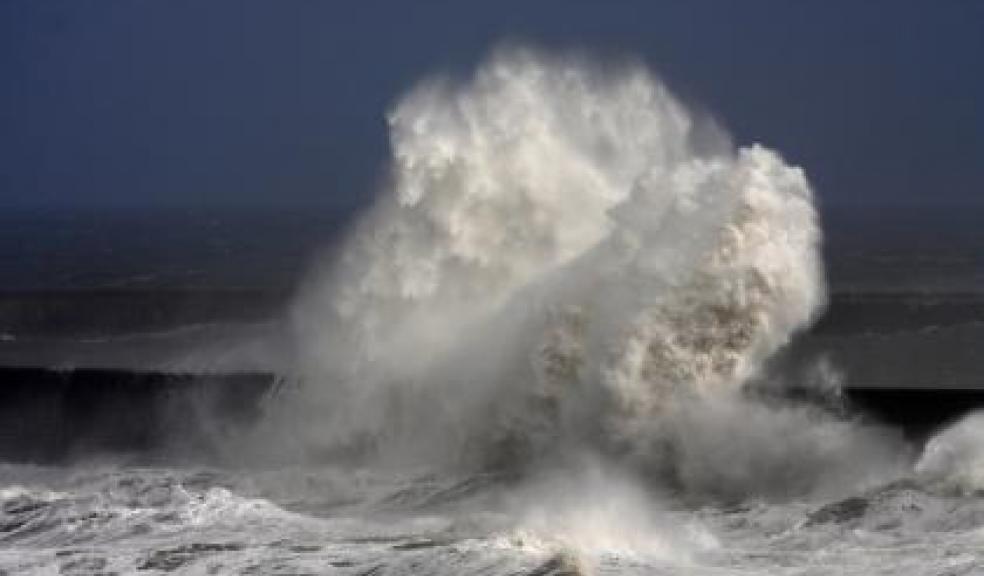
Storms continue to batter the South West
The Met Office has warned of further disruption as storms continue to batter the South West.
The Westcountry was battered by winds of more than 90mph last night as forecasters warned of giant waves and more disruption to come as an amber warning is issued.
Devon and Cornwall Police say they are continuing to work with partners across the Force area in responding to overnight storms.
Multi-agency teams are working across the region to deal with a large amount of calls relating to road debris, damage to property and flooding.
The train track and railway station at Dawlish has suffered severe damage overnight and high tide is currently being experienced in the area. Police would ask anyone planning to travel to Dawlish in order to look at the scene to refrain and allow responders to do everything possible to help local residents.
People are also asked to stay away from coastal areas where waves may well cause damage to vehicles.
A police spokesman said: "In Plymouth The Hoe is experiencing large waves and damage to some properties. We are currently working with the local authority to make the area as safe as possible. Cornwall saw damage and debris overnight and remains in recovery this morning.
"There remains a host of minor road closures throughout the region due to road debris and fallen trees. Motorists are warned to expect the unexpected on rural roads and drive according to road conditions. Flood water should also be avoided and speeds should be lowered on the region’s main road network."
The Met Office has issued a amber weather warning up until 7pm today with winds expected to reach severe gale force. Their chief forecaster said: "A deep depression will migrate slowly northeastwards across Ireland and into Scotland today, bringing rain and very strong winds across the area. A swathe of strong southwesterly winds will run east along southern counties of England this morning, with a separate area of strong winds affecting mainly northern parts of Devon and Cornwall along with South Wales this afternoon."
First Great Western are advising passengers not to travel west of Exeter St Davids. Major damage has been caused by the poor weather and rough seas to parts of the track and sea wall at Dawlish. Also, a tree is on the line between Liskeard and Bodmin Parkway and there is poor weather in the Penzance area.
Devon County Council has renewed its call for people to take care on the county’s roads and coast paths during the current stormy weather.
The NHS in Devon has warned that the most vulnerable could be at risk. Northern, Eastern and Western Devon Clinical Commissioning Group is asking people to take care on the roads, keep warm and look in on elderly neighbours and relatives to make sure they are coping well.
Devon & Somerset Fire & Rescue Service is warning people to be aware of possible flooding. They are especially asking motorists to heed warnings not to drive through any floodwater, as it could put themselves and others at risk.
The strong winds could cause some disruption because of fallen trees and high waves along the coast.
Following the wettest January on record in some places, further heavy rainfall this week could cause river flooding in much of the South West.
Area Manager Alex Hanson said: “It is impossible to tell how deep water is or the condition of the ground beneath. Your vehicle may be swept away or become stranded. Vehicles can float away in just two feet of water.
“If you do see floodwater on the road, do not attempt to drive through it; instead try to find an alternative route. If a road has been closed, it is for the safety of the public and closure signs should be respected.”
Motorists should also be aware of the possibility of tree branches and other debris on the roads due to high winds.
The Service offers further useful advice which could help prevent accidents during heavy rainfall and flooding:
- Don’t walk on sea defences or riverbanks.
- Avoid walking or driving through flood water.
- Keep children and vulnerable people out of floodwater.
- Take care or avoid crossing bridges when water levels are high.
- Take care crossing culverts as they are dangerous when flooded.
- If your vehicle stalls, leave it immediately if safe to do so and seek higher ground.
- Do not travel in heavy rain storms unless absolutely necessary.
- Keep an eye on weather reports on local television or listen to local radio.
- Do not attempt to walk through flooded areas. Even shallow water moving fast can sweep you off your feet and there may be hidden dangers such as open drains, damaged road surfaces, submerged debris or deep channels; these can cause serious injuries or even death.
- Do not smoke, eat or drink whilst in contact with floodwater and always wash your hands afterwards
- Following a flood in your home, make sure all electrical circuits are fully dried out and checked by an electrical engineer before switching back on can cause serious injuries or even death.
The outlook for Thursday to Saturday:
Fewer showers and lighter winds initially Thursday, but rain, perhaps heavy, spreading from the south by afternoon, clearing to isolated showers overnight. Turning very wet and windy Friday night onwards.











